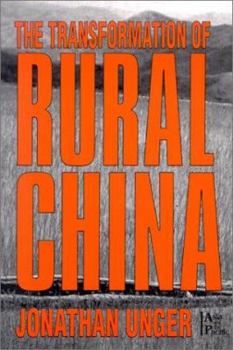The Transformation of Rural China
Select Format
Select Condition 
Book Overview
During the past quarter century Jonathan Unger has interviewed farmers and rural officials from various parts of China in order to track the extraordinary changes that have swept the countryside from the Maoist era through the Deng era to the present day. A leading specialist on rural China, Professor Unger presents a vivid picture of life in rural areas during the Maoist revolution, and then after the post-Mao disbandment of the collectives. This is a story of unexpected continuities amidst enormous change. Unger describes how rural administrations retain Mao-era characteristics - despite the major shifts that have occurred in the economic and social hierarchies of villages as collectivization and class struggle gave way to the slogan to get rich is glorious. A chapter explores the private entrepreneurship that has blossomed in the prosperous parts of the countryside. Another focuses on the tensions and exploitation that have arisen as vast numbers of migrant laborers from poor districts have poured into richer ones. Another, based on five months of travel by jeep into impoverished villages in the interior, describes the dilemmas of under-development still faced by many tens of millions of farmers, and the ways in which government policies have inadvertently hurt their livelihoods.
Format:Paperback
Language:English
ISBN:076560552X
ISBN13:9780765605528
Release Date:March 2002
Publisher:Routledge
Length:188 Pages
Weight:0.86 lbs.
Dimensions:0.7" x 6.4" x 9.0"
Customer Reviews
1 rating
The best book written on modern China's rural development
Published by Thriftbooks.com User , 22 years ago
Jonathan Unger, a highly regarded China scholar from Australia, has been studying rural China for 3 decades. In the 1970s, when most scholars were prevented from doing true fieldwork in the PRC, Unger and colleagues interviewed recent Hong Kong migrants from a particular village in Guangdong province, and produced the excellent village study "Chen Village" (later updated to include the Deng era). In the 1980s and 1990s, he started making regular extensive trips around the Chinese countryside talking to farmers, rural workers, officials, etc. "The Transformation of Rural China" is a collection of Unger's essays covering this entire span, all updated and with extensive references to other scholars' work. The first 90 pages of this 250 page book are about the Mao era. There are essays on the state's power at the village level, the rural class structure, ideology and work incentives, and the Cultural Revolution. One point that hasn't been made by many others is that the peasants were not opposed to collective farming per se, what they resented was the lack of economic freedom given the collectives. The state's sometimes irrational restrictions on what the village collectives could do (what to plant, how to plant it, how to divide income among villagers, how to market the output), and the unfairly low prices paid for the village's output all contributed to rising disillusionment with the Maoist rural development model.The rest of the book is about the reform era. First is an article on the early 1980s decollectivization. Unger's interviews undermine the "voting with feet" explanation offered by the regime and accepted uncritically by most western observers. Decollectivization was mostly a top-down, non-spontaneous, involuntary affair. This is not to say it wasn't welcomed, just that farmers had little to do with it. Most villages seem to have preferred the new decentralized family managed co-op system, yet a minority of villages that preferred to keep the collective farms crumbled under fierce state pressure. A couple of essays are about the emerging private sector in rural China, including migrant labor, and he assesses the entrepreneurial activities of local governments. A particularly important essay is the one on poverty in the hinterlands, regions that have gotten much less attention than the dynamic SE coast. Unger shows that a lot of the alleged poverty reduction from the late 1980s into the 1990s was the result of invalid statistics. The government's anti-poverty efforts for these regions in the 1990s have been sincere, but not terribly effective. The crisis in health care and schooling access in these areas is particularly acute, something that wasn't nearly so big a problem in the pre-reform and early reform eras. One of the observations many western observers might find surprising is that the government--following the advice of western and Chinese economists--has been trying for several years at least, to force the peasants to privatize lan





